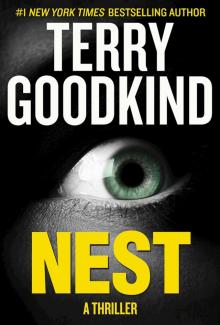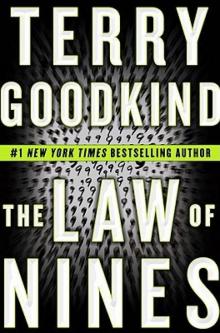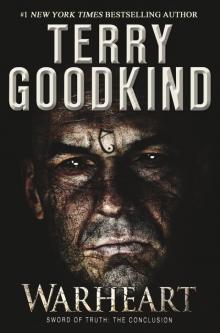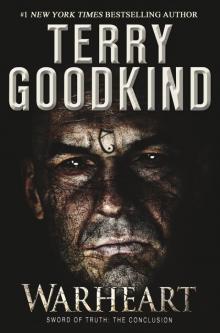- Home
- Terry Goodkind
Nest Page 2
Nest Read online
Page 2
“Run, Kate!” he screamed into the receiver. “Run!”
John slammed the phone back on the hook so that the devil couldn’t get to her through the phone lines. He raced for the front door as fast as his crooked legs would carry him.
He nearly made it.
A great weight slammed into him from behind, smashing him face-first into the door. He rebounded only to have a powerful hand grab his shirt and spin him around. The impact had dazed him. His nose felt like it had been hit with a baseball bat. He felt warm blood running down his face, dripping off his chin. The thought of so much blood gushing out of his nose horrified him.
John looked up and went stiff with terror. The devil had his pitchfork.
His eyes seemed lit from within by pure evil. They were eyes that sought only to see suffering.
His face twisting in rage, the devil roared as he drove his pitchfork down at the floor. The tines of the pitchfork punctured both of John’s shoes, severed the bones in his feet, pierced the heavy soles, and stuck solidly in the floorboards.
Even if John had tried to move, he wouldn’t have been able to. He was pinned to the floor.
As he stood in stunned terror, the devil slid a hand down into John’s pants pocket. He pulled out the photos of Kate. As John trembled, unable to think, the pain keeping him from trying to move, the devil slowly looked at the pictures, one by one, his wicked smile growing wider and wider.
John didn’t want the devil to look at Kate. He snatched for the photos. The devil caught John’s hand and twisted his fingers back until they snapped with sickening pops, like twigs breaking.
As John screamed in shock and pain, holding his twisted and broken fingers with his good hand, the devil slipped the photos of Kate into his own pocket.
“You’ve caused me quite a bit of trouble, Johnny boy.”
“Leave us alone,” John wept. “Please …”
Towering over him, the devil peered deeply into John’s eyes. “Do you remember my promise, John?”
The shocking pain of his feet impaled by the tines was just starting to register through paralyzing panic and the horrific agony of his ruined fingers.
He remembered the promises. He remembered them all too well. John’s helpless sobs grew louder.
“What do you see with those eyes of yours?” the devil asked as he loomed closer yet, as if trying to see some secret hidden in John’s eyes. “What do you see, Johnny boy?” he whispered from only an inch away.
John shook uncontrollably. “Nothing!”
“I think you see way too much.” A big hand grabbed John’s hair at the back of his head. “I’m going to fix that.”
And then the devil leaned close, his mouth beside John’s ear, and he again whispered his promise.
“I’m going to bring you everlasting darkness.”
John shrieked in fright and pain as something terribly long and sickeningly sharp slammed twice up into the core of his body. He couldn’t draw the full breath he so desperately needed.
The devil’s teeth looked huge as his jaws opened wide, coming for what he wanted. The teeth raked John’s face, peeling away his eyelids.
“In the scheme of things,” the devil said as he forced a thumb deep into the side of one of John’s eye sockets, “this doesn’t really matter. After all, the universe, too, is blind.”
The distant words made no sense to John as he struggled and screamed in the agony that was only just beginning.
He felt twisting pain and darkness pressing into his eyes.
He hoped that Kate would run, run fast, run far, get away….
CHAPTER
THREE
Kate looked up when Detective Sanders called her name. She was in a daze. None of it felt real.
He leaned an arm on the roof of the car, just above the open back door where she sat sideways, despairing because there was nothing she could do. He’d been the one who had met her and taken her aside when she had arrived at John’s house.
He was older and a bit overweight, and more comforting than his austere, pockmarked face had at first suggested.
“Miss Bishop,” he said in a sympathetic but formal tone, “do you feel up to answering a few questions?”
Kate nodded. “But I’m afraid I don’t know anything that could help you find out who could have done this.”
A woman detective in a dark suit stood nearby, within earshot, as she scanned the scene lit by all the headlights of police cars. She had only just arrived and hadn’t said anything after coming out of the house. She looked to be a few years older than Kate, maybe in her middle thirties. Her posture, her shoulders, the open collar of her stark white shirt, and the cut of her clothes suggested that she took care of herself. Her short brown hair turned inward just below her strong jawline. Her dark eyes scrutinized Kate so closely, so deliberately, that it was beginning to make her feel self-conscious.
Detective Gibson, also in a white shirt, a tie, and a gray jacket similar to the one that Detective Sanders wore, returned from the house to whisper to the woman detective. Like Detective Sanders’s, his hair was cut so short it was the next closest thing to being shaved bald. Thick skin bunched up in creases at the back of his bull neck.
Detective Sanders sucked something from between his two front teeth and held up a finger toward Kate to excuse himself for a moment as he stepped away to speak with the others.
All three wore police badges on their belts. Under their jackets, at their sides, Kate saw that they all carried Glock handguns. The detectives all seemed professional in a way that Kate found reassuring, if there could be such a thing in such a situation.
A pair of patrolmen in dark uniforms stood at ease on the porch, flanking the front door, seeing to it that no one without authorization went in. All the activity was quieting down somewhat, now that her brother’s body had finally been removed from the house to a coroner’s van. She wondered what she would need to do to recover her brother for burial. She supposed she should call the funeral home she had used for her parents. They would likely know what to do.
People carrying cases of equipment came and went. All of the activities and procedures were a confusing mystery to Kate, although they were obviously looking for evidence to try to find the killer. From time to time she’d seen flashes as everything in the house, it seemed, had been photographed.
But even if she didn’t know much about their specific jobs, she recognized that they were well orchestrated and methodical as they went about their tasks. No one wandered around in confusion. Everyone but Kate knew what to do.
No one hurried, either. She supposed that there wasn’t any point in rushing. There was no one to rescue, no fleeing suspect to chase down and arrest. Besides, this was their daily job. It was just another day at work to them. Kate knew that, for her, it would always stand out as one in a handful of the worst days in her life.
When she’d first arrived she had wanted to go into the house and see her brother. The detectives wouldn’t let her. They told her that they needed to do their work first. Detective Sanders told her, in a confidential tone, that it would be better if she didn’t see her brother that way, in the house where it had happened. He told her that she would not want that to be her memory of her brother. As much as she’d thought that she wanted to see for herself, his candor as he had looked into her eyes had given her pause and made her realize that he was probably right.
With all the people going in and out, the detectives huddled in hushed discussions, and the technicians carrying equipment, it was hard to imagine the horrific scene in the house. In a way, the unknown only made it worse.
So far the only thing she knew for sure was that her brother was dead. Right from the beginning they’d said that it was murder. The way they said it made it clear that there was no doubt at all about that part of it. Kate couldn’t stop her imagination from racing off in every direction. But most of all, she couldn’t imagine why anyone would harm her brother.
On the sidewalk to eith
er side of the house, beyond the police tape, the crowds of onlookers had thinned as the night had worn on. When she’d first arrived a lot of people had been milling around outside the house, watching, gossiping, and worrying about what kind of maniac might be loose in the neighborhood.
Once, an odd, uneasy feeling had made her look up. A tall man with disheveled hair, his hands stuffed into the pockets of a light jacket, was just turning away. Even though she didn’t catch sight of his face, she could tell by the way he slipped back through the crowd that he had been standing there watching her. It gave her a chill to have strangers staring at her like that. It made her feel naked and vulnerable.
Other people looked away from her when she glanced in their direction. They, too, had been staring at her.
Detectives or uniformed officers had been close by Kate the whole time, saying little, explaining some of the process when she asked questions about suspects, about her brother’s body, about what they were doing with it and what she would need to do.
Reporters, cameramen, and news crews holding up lights had talked to a higher-ranking police officer, who basically told them nothing except that the victim was named John Allen Bishop and he had apparently been murdered in his home by an unknown assailant. When they asked about how it had happened, he said the details were being withheld and gave a number for tips.
Impeccably dressed on-air female reporters talked into cameras for the eleven o’clock news, describing it as a grisly scene. Thankfully, the police had kept Kate sheltered from the newspeople, not letting them know she was the victim’s sister. Having a reporter with fresh lipstick shove a microphone in her face and ask how she felt when she had learned that her brother had been murdered was about the last thing in the world Kate wanted to have to deal with.
“He didn’t suffer, did he?” Kate asked up to Detective Sanders when he finally returned. She wondered if she’d already asked the question, but if she had, she didn’t remember his answer. “Did John suffer? Can you at least tell me that?”
Detective Sanders stopped leafing through his notes as he looked down from beside the open car door. “I can’t say for sure, Miss Bishop, but I don’t believe so. We believe it to have been over quickly.”
Kate pulled a crumpled tissue from the pocket of her jeans and worked it in her fingers. He returned to methodically flipping back through his notes. “Miss Bishop, you said that when you were on the phone with him, your brother suddenly yelled at you to run, and then hung up.”
Kate nodded. “That’s right. I called 911 right away.”
“Do you have any idea why he would say such a thing? Why would he say to run? You weren’t close to his house.”
Kate wiped her nose with the tissue before answering. “With John’s mental handicap he wasn’t able to understand things the way a normal adult could. Being halfway across the city or even halfway across the country wouldn’t have meant anything to him if he was afraid. He viewed the world simplistically, as if everything was immediately around him. He didn’t grasp concepts like distance very well.”
Detective Sanders gestured with his pen. “So when he said for you to run, you feel that he might have simply meant that there was someone there, in the house, and so in his way of thinking that person represented a danger to you as well as to him.”
“Probably.” Kate brushed her black bangs to the side as she glanced up. “He always worried about me.”
“And with his mental disability he was still able to hold down a job?” Detective Gibson asked as he stepped up beside Detective Sanders.
“Yes.” Kate looked up into the man’s unexpressive face. “He worked at the Clarkson Center for Developmental Disability.” She gestured over her shoulder. “On Hamilton Street. They provide work that people like John can do. It helps them be self-sufficient. The doctors had recommended that he be allowed to lead as normal a life as possible.”
“So you feel he was competent to live alone?” Detective Gibson asked. Despite his formidable looks, he had an agreeable voice. She could tell that he was deliberately trying not to make it sound like an accusation of negligence on her part.
“Yes. Fortunately, he wasn’t as profoundly mentally handicapped as some. He was able to take care of himself pretty well. The doctors said that it would be better for him if he did, if he felt responsible for his own life. Having a sense of purpose and control really did help him be happier.
“He took the bus to work and back. He could walk to the store. The people there all know him. He could mostly take care of himself and he liked doing it. He felt comfortable in the limited places he went.
“He wasn’t left to fend for himself as much as it might seem. Unless I was out of town for my job I’d come over often to check on him. I drove him places like to the doctor, or to the dentist, or to go out for a meal. Sometimes I’d take him with me when I shopped for clothes. He liked that. As long as I was with him when he was in a strange environment he felt safe.
“I helped him take care of bills, made sure that he ate properly, made sure he did his chores—things like that. He was slow, but he could do simple things for himself. It was hard on me, emotionally, not to be there all the time, but I think it was right for him to be able to live his own life.”
“When was the last time you were here?” Detective Sanders asked without looking up as he wrote in his notebook. “The last time you actually saw him?”
Kate rubbed her fingertips back and forth across her brow. “A little over three weeks ago. I’ve never been gone for that long before but I had to be in Dallas for my job. I’m an auditor at KDEX Systems. There were irregularities at our office in Dallas and I had to go down there to look into it. I called John just about every night, though.”
“So the reason for your call to him earlier tonight was to let him know that you were back in town?”
“Yes.” Kate looked up at the man’s waiting face. “Besides checking on him, I had to tell him that a relative—my mother’s half brother—had died. I just found out about it earlier today.”
“I’m sorry to hear about that, ma’am,” Detective Gibson said. “When did he pass away?”
“He died a little over three weeks ago—the twelfth of last month—out in Nevada. He was murdered.”
Detective Sanders looked at her over the top of his notebook. “Murdered?”
CHAPTER
FOUR
Detective Gibson, a few creases appearing on his brow, asked the same thing. “This uncle of yours was murdered?”
“Yes.”
“How was he killed?” Detective Sanders asked.
Kate lifted a hand in a weak gesture. “I’m not sure of the circumstances. An Esmeralda County sheriff, out in Nevada, called to tell me that Everett had been killed in the course of a robbery. It didn’t make a lot of sense. Everett didn’t have much worth stealing, at least not from what I knew of him.”
“Did they say how he was murdered? Any specifics?”
Kate shook her head. “No. Just that he’d been killed in the course of a robbery. I assumed that he’d been shot. But now that you ask, I guess I don’t know that for a fact.
“I only met Everett once when I was a girl and don’t really know much about him. The sheriff gave me the number of Everett’s lawyer and suggested I call him. When I did, the lawyer told me that John and I had been named in Everett’s will because we were the only next of kin. I thought Everett would have left his things to a friend, or someone he knew out there, but he didn’t. Whatever he has, he left it to us.
“The lawyer said that Everett had long ago made arrangements for his burial—one of those payment plans—so he had already been laid to rest as per his wishes. The lawyer said that John and I now owned the trailer Everett lived in, his pickup, and his personal effects. I’m supposed to go out there and see to them as soon as it’s convenient. But now …” She gestured helplessly toward the house.
She felt stupid for not having asked such a basic question as how a relative ha
d been murdered. It wasn’t like her not to ask questions. In fact, her job was to investigate, ask questions, get to the bottom of things.
But it had been such an unexpected call, and such unexpected news, that she hadn’t thought to ask how he had been killed. That, and the sheriff had been rather terse in a way that didn’t invite questions. She thought that with a murder on his hands he must have been busy.
With a thumb, Kate smoothed down creases on the leg of her jeans as she watched another man wearing latex gloves carry a black plastic bag out of the house, then slide open the door of a white police van and put the bag inside.
Kate didn’t really even know Everett. He was a hermit of sorts and virtually a stranger to her. Needing to handle his estate had seemed like it was going to be a nuisance she really didn’t need. After the call it had occurred to her that maybe she could tell the lawyer to simply donate everything to a charity.
Detective Gibson started back toward his car. “I’ll go check it out,” he said over his shoulder to Detective Sanders. As she watched him walking away, Kate noticed the female detective still standing close, listening, watching her.
“Did your brother have any … disagreements with anyone at his job?” Detective Sanders asked.
Kate glanced up at the frown on his pockmarked face. “I don’t think so. John always told me about what was happening in his life. He never mentioned anything like that. He was upset a while back because some kids called him names when he was walking home from the bus. Once he told me about it he seemed to feel better. I think he’d forgotten all about it by the next day.
“He liked his job. He always said that the people there were nice. John depended on me to protect him when he was afraid. I think he would have told me if he was having any kind of trouble at work.”
With the notepad in one hand and his pen in the other, Detective Sanders hiked up his pants as he eyed a group of men leaving the house with boxes and metal cases. Each person took off blue paper booties and put them in a sack on the porch.
“Miss Bishop, would you be willing to go in with us? They haven’t cleaned up anything, except for removing your brother, but it would be a big help if maybe you could explain a few things for us. But if you don’t feel comfortable—”

 Confessor
Confessor Wizard's First Rule
Wizard's First Rule Shroud of Eternity
Shroud of Eternity Debt of Bones
Debt of Bones Nest
Nest Stone of Tears
Stone of Tears The Omen Machine
The Omen Machine The First Confessor
The First Confessor Trouble's Child
Trouble's Child Faith of the Fallen
Faith of the Fallen Chainfire
Chainfire Naked Empire
Naked Empire Temple of the Winds
Temple of the Winds Severed Souls
Severed Souls The Law of Nines
The Law of Nines Blood of the Fold
Blood of the Fold Warheart: Sword of Truth: The Conclusion
Warheart: Sword of Truth: The Conclusion The Sky People
The Sky People Heart of Black Ice (Sister of Darkness: The Nicci Chronicles Book 4)
Heart of Black Ice (Sister of Darkness: The Nicci Chronicles Book 4) Hateful Things
Hateful Things The Scribbly Man
The Scribbly Man The Pillars of Creation
The Pillars of Creation Soul of the Fire
Soul of the Fire Wasteland
Wasteland Heart of Black Ice
Heart of Black Ice Crazy Wanda
Crazy Wanda Death's Mistress
Death's Mistress Siege of Stone
Siege of Stone The Third Kingdom
The Third Kingdom Into Darkness
Into Darkness The Girl in the Moon
The Girl in the Moon Witch's Oath
Witch's Oath Temple of the Winds tsot-4
Temple of the Winds tsot-4 Naked Empire tsot-8
Naked Empire tsot-8 Wizard's First Rule tsot-1
Wizard's First Rule tsot-1 The First Confessor (The Legend of Magda Searus)
The First Confessor (The Legend of Magda Searus)![[Sword of Truth 9] - Chainfire Read online](http://i1.bookreadfree.com/i1/03/27/sword_of_truth_9_-_chainfire_preview.jpg) [Sword of Truth 9] - Chainfire
[Sword of Truth 9] - Chainfire Chainfire: Chainfire Trilogy Part 1 tsot-9
Chainfire: Chainfire Trilogy Part 1 tsot-9 Soul of the Fire tsot-5
Soul of the Fire tsot-5 Pillars of Creation
Pillars of Creation Faith of the Fallen tsot-6
Faith of the Fallen tsot-6 The Pillars of Creation tsot-7
The Pillars of Creation tsot-7 Blood of the Fold tsot-3
Blood of the Fold tsot-3 Warheart
Warheart Stone of Tears tsot-2
Stone of Tears tsot-2 Death's Mistress--Sister of Darkness
Death's Mistress--Sister of Darkness Phantom: Chainfire Trilogy Part 2 tsot-10
Phantom: Chainfire Trilogy Part 2 tsot-10 Confessor: Chainfire Trilogy Part 3 tsot-11
Confessor: Chainfire Trilogy Part 3 tsot-11